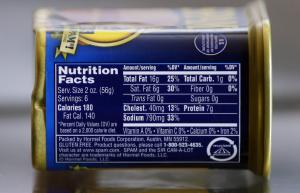May 23 (UPI) — A new study shows that recommended dietary allowance, or RDA, of protein may not be sufficient for the elderly and critically ill.
The RDA are found on the nutrition labels on all processed food and food manufacturers are obligated to list the nutritional value of their products and the percent daily value of the RDA for certain nutrients.
RDA guidelines are established by the Food and Nutrition Board of the National Academy of Sciences’ Institute of Medicine and are set to meet the requirements of 97.5 percent of the healthy adults over age 19.
However, the RDA on nutrition labels were set in 1968 and those used by researchers were set in 2003, and a recent study sheds light on the need to update those guidelines.
Researchers at McMaster University in Canada have found the RDA values do not meet the protein needs of the elderly and critically ill patients.
“A big disservice is being done,” Stuart Phillips, of McMaster University, said in a press release. “The prescribed 0.8 g/kg/day just isn’t enough protein for the elderly and people with a clinical condition. This shouldn’t be communicated as what is ‘allowed’ or even ‘recommended’ to eat.”
Phillips suggests that the quality of proteins should be considered when setting RDA guidelines, recommending protein supplements and a stronger focus on leucine, which is an indispensable amino acid and building block for proteins.
Elderly adults have a higher need for leucine to help build muscle proteins.
Leucine could be beneficial to increase protein intake for critically ill patients who can lose lean body mass rapidly.
“I think it’s clear we need some longer-term clinical trials with older people on higher protein intakes,” Phillips said. “These trials need to consist of around 400-500 people.”
The research was published in Frontiers in Nutrition.

COMMENTS
Please let us know if you're having issues with commenting.